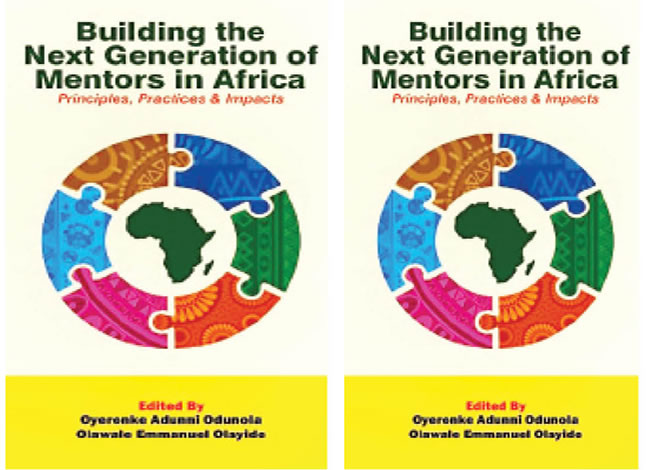A review of Building the Next Generation of Mentors in Africa: Principles, Practices and Impacts, edited by Oyeronke Adunni Odunola and Olawale Emmanuel Olayide by Ladi C. Yakubu.
THE world has become very competitive and is indeed becoming more competitive everyday, necessitating the need for all organisations, institutions and societies to be prepared and alert and conscious of the responsibility to get themselves ready and equipped to be able to perform at the utmost best if they are interested in competing successfully and functioning at the optimal level. And given that the most important resources for functioning is human resources, the onus is on every organisation, institution and society to be concerned with how to keep its human resources at the topmost level in terms or training and retraining in order for the human resources to deliver as expected. Oyeronke Adunni Odunola and Olawale Emmanuel Olayide, editors of the new publication from the stable of University of Ibadan Press, Building the Next Generation of Mentors in Africa: Principles, Practices and Impacts, in this wise, are convinced that one superior way to get the human resources tuned toward high performance would be mentoring and mentorship. The eight-chapter book, featuring contributions from ‘seasoned mentors with demonstrable experience and significant exposure …(and)impeccable track records of raising mentors across the continent of
Africa and beyond,’ tells us that mentoring – the art and science and processes through which the resources of experienced hands are deployed to help new and inexperienced ones to become experts ready to take on the same assignment for younger ones later in a continuous and unending way, – is what has to be adopted and incentivised by any discerning organisation in order to keep its human resources alert and constantly attuned and fresh and adaptable to every circumstance in order to operate well in the current demanding environment and be in a position to assure itself of success always.
The first chapter in the book by Victor O. Adetimirin makes a distinction between mentoring and supervision, showing that whereas mentoring involves some level of supervision and supervision also incorporating some aspects of mentoring to be successful, yet mentoring is a more demanding and perhaps higher level of responsibility and commitment over time to helping the new one progress and reach projected attainments. The recommendation from the chapter is the need to go beyond supervision to put in place structures for functional mentoring in order to have a higher level of growth and development and performance for and from staff. The second chapter by Samuel AyodejiOmolawal takes the argument higher by calling for the institutionalisation of mentoring at the University of Ibadan against the background of the arguments for the positive accruements from such a step given the contributions that mentoring would do to keep the University at its top performance level.
Ayobami Ojebode and Oluwaseun Ayomipo, in the third chapter, highlight the ingredients of effective mentor-mentee communication, positing that mentoring involves a large dose of communication between a mentor and their mentee(s), such that both mentors an mentees must work hard to ensure effective communication without which it would be difficult, if not impossible, for mentoring to succeed. The same way that Oyeronke Adunni Odunola, in chapter four, asserts that mentoring elicits a win-win situation for all those involved in mentoring as the process positively transforms all the parties with benefits to the mentor, mentee, the organisation and even the wider society. She, therefore, argues for the imperativeness of mentoring even as she delineates it from other career enabling acts and terminologies such as coaching, consulting, counselling, and training. Indeed, it would seem that mentoring offers the profess through which it is possible to get all the advantages inherent in all these other terminologies as it encompasses all of them in some way. And this is why mentoring entails sacrifices from all concerned in order to help transform the society, with Olutokunbo B. Oyesola, in chapter five of the book, calling for such sacrifices from early and mid-career researchers in order for them to seek for and benefit from well appointed mentoring scheme to help them make necessary progress on the career ladder.
Olanike K. Adeyemo, in chapter six, makes a powerful case for role model illustration in mentoring, suggesting that everybody should prepare to be a mentor by being conscious of the need to be a role model everywhere one finds themselves, as ‘the choice is not about whether someone wishes to be a role model or not, but rather about what kind of role model they want to be.’
Ebenezer Olatunde Farombi, in chapter seven, submits that mentoring does not just aid and help career development, but also gives psychosocial advantages through improvement in confidence and personal growth. And in the eighth and final chapter of the book, Olawale E. Olayide, Omobolaji O. Obisesan and Oyeronke A. Odunola show and demonstrate the importance and contribution of mentoring in real life by giving an assessment report on the impact of mentoring in the case of some early career researchers in Sub-Saharan Africa.
Using data of selected early career researchers in the Climate Impact Research Capacity and Leadership Enhancement (CIRCLE) programme in sub-Saharan Africa, statistical analyses show noticeable improvement in the web metrics of the early career researchers under mentoring, confirming that ‘mentorship process delivers significant impact on the research outputs of early-career researchers in sub-Saharan Africa.’
Evidently, this book is a compendium of useful and necessary information on the topic of mentoring and how it could be done and arranged successfully to help the process of development in Africa.
- Yakubu is with the Department of Communication and Language Arts, University of Ibadan, Oyo State.






